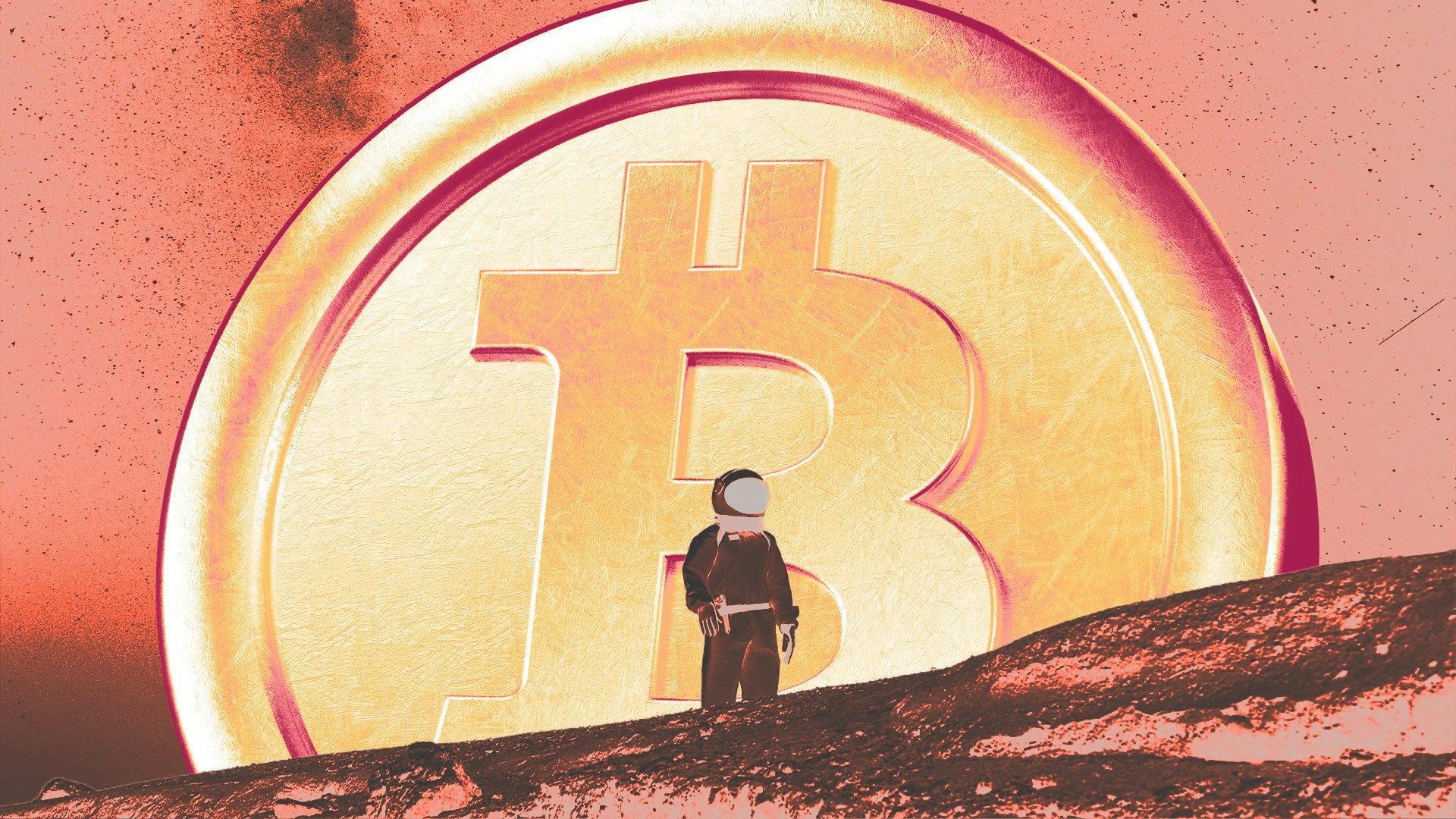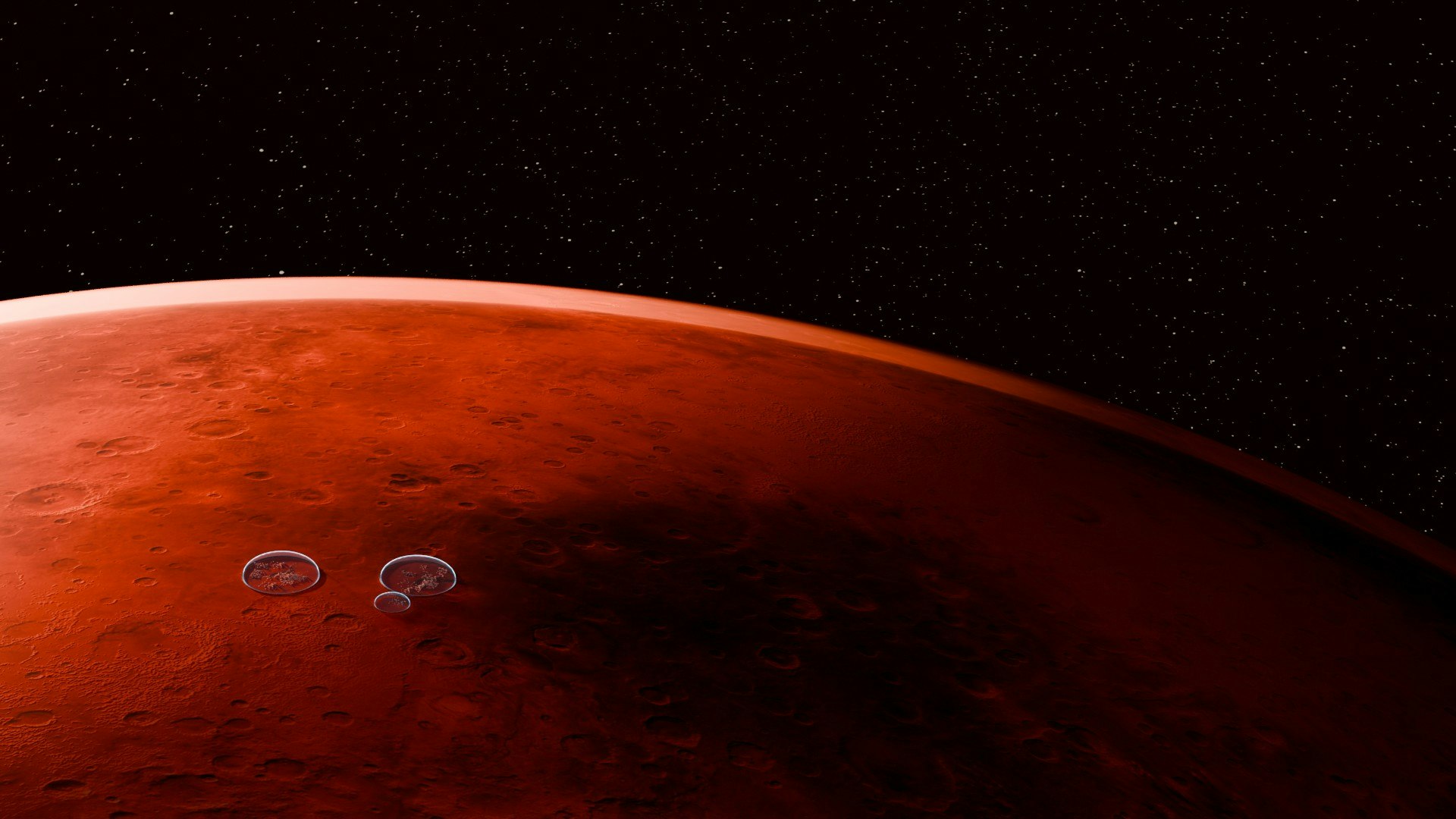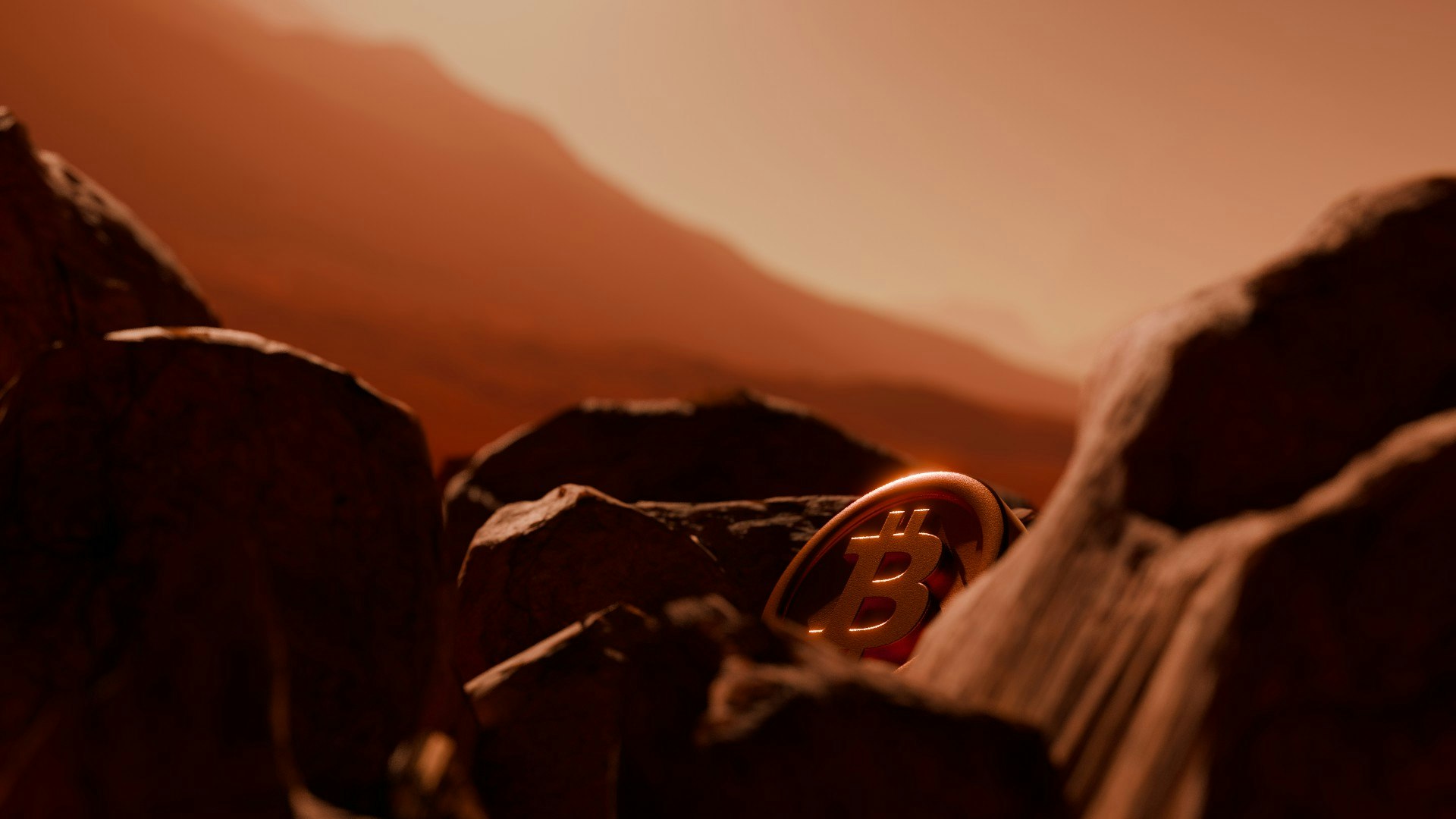Should You Buy Bitcoin Today to Spend on Mars Tomorrow?
Buy Bitcoin today for your life on Mars tomorrow. Why? Because the Martian economy is already being planned.
In this article...
- Discussions have already begun about what currency will be used on Mars
- Bitcoin is an obvious choice as it won't need to be "transported" there
- There are other advantages to using cryptocurrency off-planet.

What will be the currency on Mars? Here’s an idea: Buy Bitcoin (BTC) just in case. Why? Because the boffins who are setting humans up on Mars are starting to talk about the monetary system. And that monetary system will probably be a crypto economy from its inception.
So now there are more questions. Will BTC be the currency of the Red Planet? The idea is insanely interesting as we get closer to building the first settlement in space.
Colonising Mars
NASA thinks that it will be able to send astronauts to Mars as early as the 2030s. But private space racers like SpaceX are grinding to make it happen before then.
Calling ourselves an interplanetary species is so very tantalisingly close. And you and I both know we will all be utterly glued to whatever reality show spawns from colonization.
The Martian economy: What will be the currency on Mars?
As weak and squishy humans prepare to embark on this monumental journey, it's a good time to talk about the everyday practicalities of establishing a sustainable society on the Red Planet.
Among these considerations, the choice of currency stands out as a big one.
Elon Musk has said that cryptocurrency will be used to pay for things on Mars. And as he is the biggest of the big dogs who are aiming to set a lot of Mars up for habitation.
Why crypto on Mars?
So why is using crypto on Mars a good idea? Countries come and go, and so do fiat currencies (fiat currency is normal money, like the US Dollar, the Australian Dollar, or the British Pound).
People will come to Mars from places across earth to create a new civilization, so it seems like a bad idea to go with just one country’s currency. The most intelligent decision would be to use a currency with no political background.
Bitcoin is native to everyone on Earth. No one sovereign monetary system (like the US dollar, or the Chinese Yuan, for example) will establish dominance on Mars if Bitcoin is used. Bitcoin users are self-sovereign.
Buy Bitcoin for Mars?
Using Bitcoin on Mars has many advantages over traditional fiat currencies. It can be used person-to person, no matter where those people are on earth, as long as those involved in the transaction are connected to the internet.
To use it, you don’t need to have a government or a bank, and borders can theoretically be ignored. Bitcoin can also be used in an interplanetary way, in this same exact way.
Anyone can participate in the Bitcoin network without needing permission from any authority. This means that people who previously didn’t make the cut for traditional banking systems (for reasons like not having a permanent home address) can now take part in the new financial system.
And here’s the other sweet spot. There is no one ruler of Bitcoin, it is owned by everyone who wants in.
So already, we are starting with an even playing field and a clean slate. And why not? Who wants to drag in an old legacy financial system with all of its problems to a new world?
Bitcoin, or an Interstellar CBDC?
Amy-Rose Goodey is a Blockchain expert.
Goodey says that the adoption of digital currency and tokenization of real world assets entering mainstream is already happening on Earth, and that will just transcend to space naturally. It will be possible to send Bitcoin or other cryptos back to Earth from Mars, and vice versa. “We're already communicating through satellites now. And communication is getting better and better.”
Buy Bitcoin or a CBDC?
If Bitcoin isn’t used on Mars, then a Central Bank Digital Currency (CBDC) might be used. This is a cryptocurrency issued by a central body, like a central bank.
For Mars, there may well be an international earth council gathered together to fund the colonization of Mars, and to fund the massive build that would need to take place.
Goodey thinks that Mars needs to be decentralized from the outset.
“A global satellite network, combined with blockchain and cryptocurrency, could revolutionize space exploration by enabling secure communications and payments. Governments could pool resources into a central dedicated bank for the purpose of space activities, creating a central bank digital currency (CBDC) that acts as programmable money.
“This CBDC would facilitate automatic transactions and smart contracts, ensuring transparency and efficiency among governments. A cryptocurrency or stablecoin backed by these pooled money/assets could fund space mining operations and other space activities.”
Goodey says that this system, using tight security and a solid legal framework, would ensure fair and equitable access to space resources.
A Mars CDBC?
CBDCs are a controversial subject on Earth. But on Mars it may be necessary, at least in the build stage. It is a likely scenario that Martian individuals would hold both Bitcoin and the Mars CBDC. And the fact that this makes so much sense already is exciting stuff.
Remittances made easy: Bridging Earth and Mars
If we know anything about humans, Martian colonists will surely be maintaining financial ties with their connections back on Earth. Bitcoin's decentralized nature and borderless functionality make it the perfect tool for facilitating remittances between the two planets. The main point here is that it can be sent across space.
The Interplanetary File System (IPFS) is a peer-to-peer protocol designed for storing and sharing data across vast distances.
Bitcoin transactions can be transmitted between Earth and Mars via satellites. These transactions would be recorded on the Bitcoin blockchain. To facilitate these transactions, a network of Bitcoin nodes can be established on Mars, acting as intermediaries between Martian users and the broader Bitcoin network.
There will come a day when the seamless exchange of Bitcoin between Earth and Mars happens. This means that colonists can send money back home or receive funds from earth, for their pay, for example.
But what about other assets in space? What if you want to buy an apartment on Mars that overlooks the Hellas Planitia?
Tokenization of space
Goodey loves to talk about the tokenization of space, space assets, asteroid mining, and the way that humans will engage with space in the future. She says that there is a lot going on at the moment in space law.
“Space law, much like crypto regulation, is still evolving and remains ambiguous. This is because equal access to space is essential for all continents, global leaders, and governments. No single country can dominate space; everyone must have fair access to resources on interstellar bodies.
”There are no clear regulations on the commercial exploitation of space resources like minerals on asteroids or the Moon. There are resources on the moon, on other planets and on asteroids that Earth will require in the next couple of decades.
“We will need to have a really transparent system where governments have equal access to that piece of the pie.”
Helium
Let’s talk about helium. According to Goodey, “On Earth, helium is a finite resource. We can’t make any more of it. But what we do know is there is a supply of Helium-3 on the moon and on some asteroids. There are already asteroid mining companies that are building the equipment to capture the helium.
“Helium is used in MRI machines and many other medical devices. It's not just for balloons, obviously. We need it for the future of science and the medtech world. This is where the tokenization of space assets can ensure that resources are equally distributed and not abused or hoarded.”

Space laws
Goodey believes that space law needs to catch up to a future that is looming large.
“Unfortunately, space regulation and space law isn't defined clearly enough because we haven't had a need yet. However it is like the crypto industry. When it was born the regulators rushed to protect consumers and solve problems. This is what needs to happen in space. I think tokenization of space assets and the transparency required for interstellar activities will play a massive part in that.”
Countries will have to come together to build out space. “There are already agreements, treaties and principles across the globe on some of these matters. But there needs to be a definitive plan in place for equal distribution when mining starts, and that needs to be really transparent.
“If one country takes more than their share, that would probably cause a power imbalance and likely wars. Having everything on a transparent distributed ledger can solve these problems. Other assets in space will also need tokenization — like property on Mars.”
A Martian economy built on Bitcoin
Bitcoin's unique properties make it an ideal currency for the emerging Martian economy. At least for personal use anyway. So even if we use the Mars CBDC for things like building schools and establishing a network of subterranean tunnels on Mars, Bitcoin can be used for transactions in everyday life.
Bitcoin's divisibility into smaller units (Satoshis) would allow for microtransactions at all levels of the Martian economy. This would be particularly important in the early stages of colonisation when start-ups like restaurants and cafes and even tourist businesses would need a stable income.
A new frontier
We are at the precipice of huge innovation and problem-solving in the Martian economy. We could leave a lot of problems behind that come with traditional money systems, and start afresh.
The journey to Mars is not just about exploring a new frontier; it's about building a human civilisation. And this could be a utopia in a lot of ways, despite the thin atmosphere, extreme temperatures, radiation, and psychological challenges for the first colonizers. We have a chance to make right the things that have gone wrong on Earth.
And for anyone interested in cryptocurrency, we know there’s a new dawn on Mars, and Bitcoin could be at the heart of it.
Should you learn about Bitcoin and other cryptocurrencies now for the future? That is a hard yes.
Author profile
Nicole Buckler has been a crypto culture journalist for multiple leading publications, covering all aspects of cryptocurrency and Web3. She first bought Bitcoin in 2013, not really knowing what she was doing at the time. Since then she has learned how to handle a coin or two. Got a comment? Email: Nicole.Buckler@CoinJar.com

Frequently asked questions
What will be the currency on Mars?
Nothing has been decided yet that has been released publicly, however it does seem logical to many experts that cryptocurrency will probably be used from the outset.
What is the best payment method to purchase Bitcoin?
You can buy BTC using various payment methods, such as a bank account, credit card, or even other digital currencies. The best method for you will depend on your preferences and the available options on different crypto exchanges.
Where can I buy and sell Bitcoin and other cryptocurrencies?
Crypto exchanges are online platforms where you can buy and sell Bitcoin and other digital assets. You can buy and sell Bitcoin on CoinJar.
What is the safest way to store my Bitcoin?
A cold storage wallet is the most secure option to store your bitcoin. This type of wallet is not connected to the internet, making it less vulnerable to hacking attempts.
Can I buy Bitcoin using my bank account?
Yes, many crypto exchanges allow you to link your bank account to buy Bitcoin. This is often the most cost-effective way to purchase Bitcoin, but it may take longer for transactions to process.
What is a digital asset?
A digital asset is a type of asset that exists in digital form and can be owned, traded, or used as a medium of exchange. Bitcoin and other cryptocurrencies are examples of digital assets.
What is the price of Bitcoin?
The price of Bitcoin is constantly fluctuating based on supply and demand. You can check the current price on any crypto exchange or price-tracking website. Or click here.
What are Bitcoin ETFs?
Bitcoin ETFs (Exchange-Traded Funds) are investment funds that track the price of bitcoin. They offer a way to invest in bitcoin without buying and storing the digital currency directly.
What are Bitcoin wallets?
Bitcoin wallets are software programs that allow you to store and manage your Bitcoin. There are various types of wallets, including hot wallets (connected to the internet) and cold wallets (offline storage).
Is Bitcoin a digital currency?
Yes, Bitcoin is a type of digital currency or cryptocurrency that can be used for online transactions and as a store of value.
Why would I want to buy Bitcoin to use on Mars?
While it's uncertain whether Bitcoin will be accepted on Mars, some believe that it could be a useful form of payment in a future Martian colony. It could potentially offer a decentralised and secure way to transact in a new and potentially isolated environment.


Suggested Articles

Bitcoin Dominance: Is Alt Season Near? Technical Analysis May Provide Clues
What is Bitcoin Dominance? And how can keeping an eye on it give insight into alt season? Here is the explainer.Read more
Why Should You Buy Bitcoin? Top 10 Reasons To Consider
Why should you buy Bitcoin? Here are some compelling reasons why the crypto bros and the crypto sisters think BTC is a great investment.Read more
Why Buying Bitcoin Is a Smart Hedge Against Inflation
Should you buy Bitcoin as a hedge against inflation? What even is a hedge against inflation? Let's find out.Read moreBrowse by topic
The above article is not to be read as investment, legal or tax advice and takes no account of particular personal or market circumstances; all readers should seek independent investment, legal and tax advice before investing in cryptocurrencies.
This article is provided for general information and educational purposes only. No responsibility or liability is accepted for any errors of fact or omission expressed therein. CoinJar, Inc. makes no representation or warranty of any kind, express or implied, regarding the accuracy, validity, reliability, availability, or completeness of any such information.
Past performance is not a reliable indicator of future results.
Your information is handled in accordance with CoinJar’s Privacy Policy.
Copyright © 2025 CoinJar, Inc. All rights reserved.
CoinJar, Inc. is a registered Money Services Business with FinCEN and licensed as a money transmitter, NMLS #2492913. For a list of states in which CoinJar, Inc. is licensed or authorized to operate, please visit here. In certain other states, money transmission services are provided by Cross River Bank, Member FDIC.
This site is protected by reCAPTCHA and the Google Privacy Policy and Terms of Service apply.

